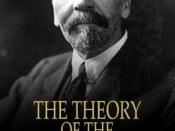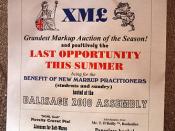Introduction
Consumption and Modernity, two things that seem to belong together.
In our society, consumption became a habit that is completely normal but at the same time seems uncontrollable and overwhelming. People seem to get lost in their own need for consumption and might as well feel lost in the over-stimulation through objects.
The possibilities are endless and markets and produces have to come up with ever more ideas to motivate customers and sell their products. The circle of consumption seems endless.
But why do we consume and what is it that makes us buy certain things but not others?
Behind the idea of consumption lies a whole science dealing with these questions. Under the name of Semiotics, scientists try to structure, order and explain the phenomenon of consumption in order to understand and to improve the business living from consumption.
The following will go into the origin of consumption as a human habit and from there go into the emergence of Semiotics as a Science of the last decade.
With the knowledge about consumption, the meaning of things and Semiotics I will then give an example for a product and its various connotations within different cultural backgrounds.
A definition of consumption
Modern culture and consumer culture have always been closely connected. The one compliments the other and therefore plays a crucial role in today's society.
But how did consumption become one major issue of everyday life and what role does it actually posses in modern society?
Different scientists, historians and writers outline the beginning of consumption in completely different times and societies.
Some claim consumption with all its facets evolved within Postmodernism, others see it starting in the 1920's and the upraise of Fordism, while again others see it earlier, even before the turn of the century.
Industrialisation surely...


